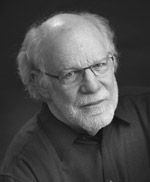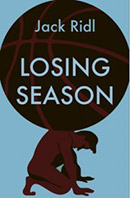Welcome to The Writer's Almanac Bookshelf, where you'll find highlighted interviews of poets heard on the show.
Jack Ridl

Losing Season reads almost like a novel. Did you intentionally approach writing a book of poetry with fictional components of plot and character, or was it a more intuitive process as the work developed?
A twitch of each. I grew up a coach's son. When I started writing poetry I was determined to become a poet who was not the "coach's son," wanted my own identity. I'd heard, "Oh, you're the coach's son" all my life. And I have to say, I was proud of that, but then it was time to hear, "Oh, is Buzz Ridl your father? Really? The coach? And you are a poet?" Once the "poet identity" was set, I realized that I had this whole world to write out from, and it was about time I entered it. I wrote a couple poems, the one about the bus driver, one about a cheerleader, one about the coach on vacation. I was off. I started imagining the town and writing about it in terms of the high school basketball team. After maybe twenty poems, I saw I could create an arc by using the whole basketball season within a tough winter, how they intersected. But I knew nothing about fiction, so my personal experiment was to see if I could write separate poems in such a way and in a certain order that the reader began to feel as if she were reading a novel. My hope was that the reader would think, "Wait a minute! He's not written a novel. It's ME who's creating the novel!"
 (Purchase Losing Season and other books by Jack Ridl)
(Purchase Losing Season and other books by Jack Ridl)Browse poems by Jack Ridl in The Writer's Almanac Archive
How long did it take you to write?
I started it almost 30 years ago, worked on it off and on. Then suddenly I saw the whole thing come together, finished a manuscript, then added a couple poems that a certain time within the narration needed, cut some that did not add to the feel of the town or the narrative.
The title of Losing Season in its singularity suggests that there have been winning seasons in Coach's past; this has not been the overall trajectory of his career. How does the theme of aging function in this context? Not only for Coach but for all the characters?
Wow, this question is remarkable. First of all, yes, it's important to recognize that the school has had winning teams in the past. There are moments throughout the book that reveal this. But what is so remarkable about your question is that the first magazine I sent any of these poems to was Poetry East. The editor is a poet I think the world of, Richard Jones. He told me, "These aren't sports poems. They're about aging!" It was great to hear this because I was writing out from what it was like to live in the world of sports, what it's like to grow up in a culture where sports is at the center. Every day, it's "News, Sports, and Weather." I was really worried that I'd be slammed for "lowering poetry to the world of sports." My take was if one of the things a writer can do is explore the culture, doesn't it make sense to explore what's at the center of ours, like it or not? So as I thought about the poems, I began to realize that sports are a place for youth and how aging is set against youth in this culture. The characters all remain attentive to the young. How many times do we hear from people who work with youth that the reason they do is that "It keeps me young." What is that about? How this theme then functions during this season is that no one feels young. Even the players don't feel young. When you win, you are young! People now recognize that they are aging, losing everything from family to dreams and react to this in a variety of ways. There's nothing like losing to make one, well, "not young."
What has your involvement with basketball taught you about writing and poetry?
Practice. Practice. Practice. And respect. I love practice! When you grow up working on how to dribble with your off hand for two hours at a time, it's not tiresome to attend to each element of a poem trying to get it right for that particular poem. You don't learn how to write poetry any more than you learn how to play basketball. Sure, you know your stuff, but each poem, each game asks you to adapt what you know and can do to what's demanded by the other team, by the poem. And respect. If you don't respect the game, it'll make a fool of you. If you don't respect poetry, you are a fool.
Oh and it teaches you how to lose.
In the culture of sports, winning is necessitated by another team or player losing. Do you think American culture defines most success in such terms? As a teacher of creative writing, how do you prepare your students for inevitable failures, yet ensure they have the tools to keep creating?
Most definitely American culture is built on both winning and on being terrified of being a loser. I hear this kind of thinking applied to almost everything: Who's the best poet? What's the best film you saw this year? What dog won Westminster? What's the best company, shoe, bacon, lawn care product? Who cares? It's the work that matters. We need, dare I say, nourishment. Poetry is soul food, or can be. It also can not be. Who knows when someone needs a particular poem? I don't ever want to confuse the best with what is valuable. Lots of things that aren't excellent, that aren't first, that aren't the best are of paramount value.
In all my courses I tried to help the students realize that what happens in the writing is crucial, what they must hold fast to no matter what. I'd tell them, that one in ten of my poems is effective, but all ten were worth writing. Why? Because of what the writing of a poem gives you access to.
Jack Ridl's collection, Losing Season (CavanKerry Press, 2009), follows a high school basketball team over the course of a season as they struggle through a harsh winter in a small town. No stranger to the world of basketball, Jack Ridl is the son of Charles "Buzz" Ridl, the legendary head coach at Westminster College and the University of Pittsburgh. Recently retired, Ridl taught at Hope College in Holland, Michigan for more than 37 years, and together with his wife, Julie, founded the college's Visiting Writers Series. He was named one of the 100 most influential sports educators by the Institute for International Sport. His previous collection of poetry, Broken Symmetry, (Wayne State University Press, 2006) was co-recipient of The Society of Midland Authors award. Ridl's newest collection Practicing to Walk Like A Heron will be published in 2013 by Wayne State University Press.
Interview by Joy Biles